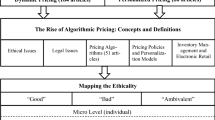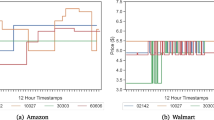Abstract
We study the Uniform Price Auction, one of the standard sealed-bid multi-unit auction formats in Auction Theory, for selling multiple identical units of a single good to multi-demand bidders. Contrary to the truthful and efficient multi-unit Vickrey auction, the Uniform Price Auction encourages strategic bidding and is generally inefficient, due to a “Demand Reduction” effect; bidders tend to bid for fewer (identical) units, so as to receive them at a lower uniform price. All the same, the uniform pricing rule is popular by its appeal to the anticipation that identical items should be identically priced. Its applications include, among others, sales of U.S. Treasury notes to investors and trade exchanges over the Internet facilitated by popular online brokers. In this work, we characterize pure undominated bidding strategies and give an algorithm for computing pure Nash equilibria in such strategies. Subsequently we show that their Price of Anarchy is \(\frac {e}{e-1}\). Finally, we show that the Price of Anarchy of mixed Bayes-Nash equilibria with undominated support is at most \(4-\frac {2}{k}\), where k is the number of auctioned items. To the best of our knowledge, our work provides the first (constructive) proof of existence of pure Nash equilibria in undominated strategies and the first performance evaluation (with respect to economic efficiency) of this popular auction format.

Similar content being viewed by others
Notes
Among them, eBay ceased its own variant in 2009.
It is known that for submodular valuation functions on identical units, the allocation algorithm of the Uniform Price Auction produces an optimal allocation when bidders bid truthfully. This property does not hold in the case of non-identical items, where only a 2-approximation is achieved [17].
References
Ausubel, L., Cramton, P.: Demand Reduction and Inefficiency in Multi-Unit Auctions. University of Maryland, Technical report (2002)
Bhawalkar, K., Roughgarden, T.: Welfare Guarantees for Combinatorial Auctions with Item Bidding. In: Proceedings of the ACM-SIAM Symposium on Disctrete Algorithms (SODA) (2011)
Bresky, M.: Pure Equilibrium Strategies in Multi-unit Auctions with Private Value Bidders. Technical Report 376, Center for Economic Research & Graduate Education - Economics Institute (CERGE-EI), Czech Republic (2008)
Caragiannis, I., Kaklamanis, K., Kanellopoulos, P., Kyropoulou, M., Lucier, B., Paes Leme, R., Tardos, E.: On the efficiency of equilibria in generalized second price auctions. arxiv:1201.6429 (2012)
Christodoulou, G., Kovács, A., Schapira, M.: Bayesian Combinatorial Auctions. In: Proceedings of the International Colloquium on Automata, Languages and Programming (1) (ICALP) (2008)
Clarke, E.H.: Multipart pricing of public goods. Public Choice 11, 17–33 (1971)
Dobzinski, S., Nisan, N.: Mechanisms for Multi-Unit Auctions. Journal of Artificial Intelligence Research 37, 85–98 (2010)
Edelman, B., Ostrovsky, M., Schwartz, M.: Internet Advertising and the Generalized Second-Price Auction: Selling Billions of Dollars Worth of Keywords. The American Economic Review 97(1), 242–259 (2007)
Engelbrecht-Wiggans, R., Kahn, C.M.: Multi-unit auctions with uniform prices. Economic Theory 12(2), 227–258 (1998)
Feige, U.: On Maximizing Welfare When Utility Functions Are Subadditive. SIAM Journal on Computing 39(1), 122–142 (2009)
Feldman, M., Fu, H., Gravin, N., Lucier, B.: Simultaneous Auctions are (almost) Efficient. In: Proceedings of the ACM Symposium on Theory of Computing (STOC), pp. 201–210, arXiv:1305.0085 (2013)
Friedman, M.: A Program for Monetary Stability. Fordham University Press, NY, New York (1960)
Fu, H., Kleinberg, R., Lavi, R.: Conditional equilibrium outcomes via ascending price processes with applications to combinatorial auctions with item bidding. In: Proceedings of the ACM Conference on Electronic Commerce (EC) (2012)
Hassidim, A., Kaplan, H., Mansour, Y., Nisan, N.: Non-price equilibria in markets of discrete goods. In: Proceedings of the ACM Conference on Electronic Commerce (EC) (2011)
Kittsteiner, T., Ockenfels, A. In: N. Jennings, G. Kersten, A. Ockenfels, C. Weinhardt, (eds.) : On the Design of Simple Multi-unit Online Auctions (2007). Negotiation and Market Engineering, number 06461 in Dagstuhl Seminar Proceedings, Dagstuhl, Germany, Internationales Begegnungs- und Forschungszentrum für Informatik (IBFI), Schloss Dagstuhl, Germany.
Krishna, V.: Auction Theory. Academic Press. April 2002.
Lehmann, B., Lehmann, D.J., Nisan, N.: Combinatorial auctions with decreasing marginal utilities. Games and Economic Behavior 55(2), 270–296 (2006)
Paes Leme, R., Syrgkanis, V., Tardos, É.: Sequential auctions and externalities. In: Proceedings of the ACM-SIAM Symposium on Discrete Algorithms (SODA) (2012)
Lucier, B., Borodin, A.: Price of Anarchy for Greedy Auctions. In: Proceedings of the ACM-SIAM Symposium on Discrete Algorithms (SODA) (2010)
Markakis, E., Auctions, O.Telelis Uniform Price.: Equilibria and Efficiency. In: Proceedings of the International Symposium on Algorithmic Game Theory (SAGT) (2012)
Milgrom, P.: Putting Auction Theory to Work (2004)
Mu’alem, A., Nisan, N.: Truthful approximation mechanisms for restricted combinatorial auctions. Games and Economic Behavior 64(2), 612–631 (2008)
Noussair, C.: Equilibria in a multi-object uniform price sealed bid auction with multi-unit demands. Economic Theory 5, 337–351 (1995)
Ockenfels, A., Reiley, D.H., Sadrieh, A.: Economics and Information Systems, volume 1 of Handbooks in Information Systems. chapter 12. Online Actions, pages 571–628. Elsevier Science, December 2006
U.S. Department of Treasury. Uniform-price auctions: Update of the treasury experience, office of market finance. available at http://www.treasury.gov/domfin (1998)
Osborne, M.J.: An Introduction to Game Theory (2009)
Paes Leme, R., Tardos, E.: Pure and Bayes-Nash price of anarchy for generalized second price auction. In: Foundations of Computer Science (FOCS), 735–744 (2010)
Reny, P.J.: On the existence of Pure and Mixed Strategy Nash Equilibria in Discontinuous Games. Econometrica 67, 1029–1056 (1999)
Roughgarden, T.: The price of anarchy in games of incomplete information. In: Proceedings of the ACM Conference on Electronic Commerce (2012)
Syrgkanis, V.: Bayesian games and the smoothness framework (2012). CoRR, arXiv:1203.5155
Syrgkanis, V., Tardos, É.: Bayesian Sequantial Auctions. In: Proceedings of the ACM Conference on Electronic Commerce (EC) (2012)
Syrgkanis, V., Tardos, É.: Composable and efficient mechanisms. In: Proceedings of the ACM Symposium on Theory of Computing (STOC) (2013)
Vickrey, W.: Counterspeculation, auctions, and competitive sealed tenders. Journal of Finance 16(1), 8–37 (1961)
Vöcking, B.: A universally-truthful approximation scheme for multi-unit auctions. In: Proceedings of the ACM-SIAM Symposium on Discrete Algorithms (SODA) (2012)
Acknowledgements
This work has been supported by the research project “DDCOD” (PE6-213). The project is implemented within the framework of the Action “Supporting Postdoctoral Researchers” of the Operational Program “Education and Lifelong Learning” (Action’s Beneficiary: General Secretariat for Research and Technology), and is co-financed by the European Social Fund (ESF) and the Greek State. Evangelos Markakis also acknowledges support by the project ”THALES-AGT”, which is cofinanced by the European Union (European Social Fund – ESF) and Greek national funds through the Operational Program ”Education and Lifelong Learning” of the National Strategic Reference Framework (NSRF) Research Funding Program: THALES.
Author information
Authors and Affiliations
Corresponding author
Additional information
A preliminary version appeared in Proceedings of the 5th International Symposium on Algorithmic Game Theory (SAGT 2012) [20].
Rights and permissions
About this article
Cite this article
Markakis, E., Telelis, O. Uniform Price Auctions: Equilibria and Efficiency. Theory Comput Syst 57, 549–575 (2015). https://doi.org/10.1007/s00224-014-9537-9
Published:
Issue Date:
DOI: https://doi.org/10.1007/s00224-014-9537-9




